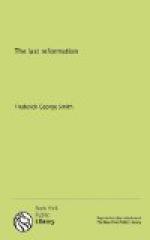This sublime scene is not a description of heaven, for the context shows its direct contact with the forms of apostate Christianity with which it is placed in contrast on earth. Certain leading figures in the scene, as Christ the Lamb and a number of angels, are heavenly beings; but their presence simply shows the divine character of the work in contrast with those other religious powers, one of which came up out of the sea and the other out of the earth. Besides, we have already shown that whenever angels figure in the symbolic scene on earth, they represent distinguished agencies among men, and the message of good angels, being obviously from heaven, is therefore the message of God. When different angels, bearing different messages, appear in the same general symbolic scene, they represent not isolated or independent movements, but different phases of the same work.
The Revelator introduces another phase of the religious movement under consideration with these words: “And I saw another angel fly in the midst of heaven, having the everlasting gospel to preach unto them that dwell on the earth, and to every nation, and kindred, and tongue, and people, saying with a loud voice, Fear God, and give glory to him; for the hour of his judgment is come: and worship him that made heaven, and earth, and the sea, and the fountains of waters” (verses 6, 7).
In the message of the angel there are set forth a number of distinct truths. Prominence is given to the call to worship the one true God. This stands in contrast with the apostasy preceding; for under the papacy its adherents “worshiped the dragon” and “they worshiped the beast,” while the second beast caused people to “worship the first beast” and to “worship the image of the beast.” The message of this angel is universal and indicates a world-wide missionary effort in which the true God and his holy worship alone will be exalted, and that before the end of time, for the judgment is set forth as an impending event for which men must speedily prepare.
But the description does not end here. An awful revelation, falling like hail-stones or coals of fire upon the heads of the devotees of modern churchianity, is proclaimed by divine authority: “And there followed another angel, saying, Babylon is fallen, is fallen, that great city, because she made all nations drink of the wine of the wrath of her fornication. And the third angel followed them, saying with a loud voice, If any man worship the beast and his image, and receive his mark in his forehead, or in his hand, the same shall drink of the wine of the wrath of God, which is poured out without mixture into the cup of his indignation” (verses 8-10).




